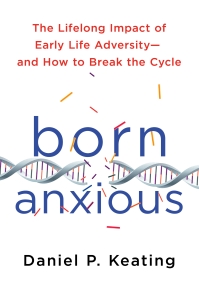Tags
Behavior, biology, Developmental biology, Gene expression, Health, Popular science, science, science and society, Science in Society
 I enjoyed Born Anxious more than I expected to but less than I hoped. Written by Daniel Keating, a psychology professor at the University of Michigan, it synthesizes over a decade of research on how stress affects the course of our lives. Keating presents an interesting and convincing case that experiences early in life — or even in previous generations — can set biological switches that have wide-ranging consequences, affecting health, social well-being, and professional success.
I enjoyed Born Anxious more than I expected to but less than I hoped. Written by Daniel Keating, a psychology professor at the University of Michigan, it synthesizes over a decade of research on how stress affects the course of our lives. Keating presents an interesting and convincing case that experiences early in life — or even in previous generations — can set biological switches that have wide-ranging consequences, affecting health, social well-being, and professional success.
I approached the book with some hesitation because I thought it might oversimplify or make too much of epigenetics, the concept at the core of the book and a subject I’m already familiar with. In the end, I enjoyed it because Keating doesn’t linger too long on the biology or oversell it; at the same time, I was disappointed because I would have liked to have a bit more biological detail. As it is, the book is an easy, comfortable read, excellently pitched for the general reader. I tend to prefer denser, more technical writing when it comes to biology, since I studied the subject, but I think this book does a great job for readers without that background.
Early in the book, I was worried that it might prove to be simplistic rather than simplifying, but Keating avoids that pitfall. Without drowning the reader in details, he builds a case for the book’s argument: that exposure to excessive stress at certain developmental stages changes the threshold for activating a gene that regulates stress reponse, putting it on a hair-trigger. People with this change have consistently higher levels of the stress hormone, cortisol, which puts a strain on their health, and they’re also likely to experience fight-or-flight reactions more easily. The argument is clearly laid out, building from the biology to the psychological and social consequences for individuals and societies. Most of the chapters end with a list of suggested reading material for readers who want to learn more about the subject, and there are more details about the research in the scientific appendix (“Research Background: A Primer”) which also includes a short bibliography. I jotted down a few notes and references to follow up on, which is usually a sign that I enjoyed a book.
Overall, I would certainly recommend this book to anyone interested in the subject. I enjoyed reading it, I learned from it, and I’m planning to read some of the books and articles it referenced. My only word of caution — which Keating also clearly sounds — is not to carry the ideas in the book too far or make too much of them. Born Anxious offers important information and a valuable perspective, but it’s just one slice through a rich, growing, and complex research field.
You can find Born Anxious on Amazon, Kobo, and Biblio, and perhaps in your local library, too.
Disclaimer: I received an Advance Review Copy from the publisher in exchange for this review.

Thanks very much for the thoughtful review! It was a challenge to convey complex work in many fields from epigenetics to epidemiology, so I am glad that you see it as accessible to the general reader. On the Research Background, I kept adding material up to the last minute, but I would now add a great deal more — it is a fast-moving field. Thanks again!
You’re welcome! Does the book have a website where readers can get more up-to-date info?